![]()
Monday, September 23, 2013
The Al-Nusra Front (Jabhat al-Nusra) is an Al-Qaeda Salafist-jihadi network, prominent in the rebel organizations in Syria. It seeks to overthrow the Assad regime and establish an Islamic Caliphate in Greater Syria, a center for regional and international terrorism and subversion. This study, conducted by the Meir Amit Intelligence and Terrorism Information Center, focuses on the Al-Nusra Front, the most significant organization among the jihadist organizations operating in Syria. The study is structured in seven sections[*], which if read in conjunction with each other, draws a complete picture of the Al-Nusra Front.
Section Six
Overview
Vast areas in northern and eastern Syria where Sunnis reside have fallen under rebel control, becoming so-called “liberated territories” where the Syrian regime has no sovereignty. It is mostly true for the governorates of Deir ez-Zor, Al-Hasakah, Al-Raqqa, Aleppo, and Idlib (see map below). The governmental vacuum has been filled by the Al-Nusra Front and other Islamic jihadist organizations which to all intents and purposes control those areas. At times they cooperate with the Free Syrian Army and other rebel organizations that hold Syrian nationalist or secular views, the majority of which are in a vulnerable position and have no ability to create an effective governmental alternative to the Syrian regime, which no longer functions in those areas.
In the so-called “liberated territories” there are often shortages of food and basic supplies, as well as lack of functioning vital services. In some cases the cause is the collapse of the Syrian regime; in others it is the intense fighting that prevents supplies from reaching the residents. Residents in various hotspots of fighting find themselves caught between the regime forces and the various rebel militias, including the Al-Nusra Front. Helping to resolve the difficulties are relief networks created by the rebel organizations and ad-hoc arrangements with the Syrian regime, making it possible to deliver humanitarian assistance to the entrapped residents.[36]
The Al-Nusra Front and the other jihadist organizations place considerable importance on establishing a governmental alternative in the so-called “liberated territories” by providing aid to the local population, considering it an important leverage for gaining the residents’ trust. In Abu Muhammad al-Julani’s video on the founding of the Al-Nusra Front (January 24, 2012), he called on his supporters to provide protection to the citizens, establish a legal system to help them settle disputes, and assist them with fuel, medicines, and other supplies. The intensive governmental activity of the Al-Nusra Front required investing considerable financial resources; however, it later became clear that it could also become a source of profit.
To create an alternative administration to the Syrian regime and gain the support of the population in various regions that they have captured, the Al-Nusra Front and other jihadist organizations have taken upon themselves government functions in various spheres of life: distributing vital food supplies, operating an Islamic justice system and enforcing law and order. In some areas they have been able to overcome the anarchy and chaos and restore an adequate level of law and order, sufficient (at least for now) to function as an alternative to the Assad regime. More often than not, Western reporters who visited the so-called “liberated territories” said that the local residents were content with the situation. In some areas, on the other hand, locals have started complaining and taking issue with the radical Islam’s takeover of the rebel organizations and the Islamists’ strict methods of control. It is our assessment that, at this point, this is not enough to pose a significant challenge to the Al-Nusra Front and its jihadist allies.
The Al-Nusra Front has established a civil network called the Department of Relief (Qism al-Ighatha)[37] to coordinate the distribution of aid to the population. The Department of Relief distributes food, clothing, blankets, and consumer products to citizens in Syria’s governorates. It also monitors prices to prevent profiteering that would hit those in need. In some areas the distribution of aid is controlled by the Al-Nusra Front Shari’ah Authority (Al-Hay’ah al-Shar’iyyah), which operates teams on its behalf in cooperation with other Islamic organizations.
In northern and eastern Syria the Al-Nusra Front has been able to take over vital national infrastructure: oil fields, oil and gas pipelines, dams, power plants, and grain silos. The Al-Nusra Front uses its control of these infrastructures to provide aid to the population as well as pay salaries and purchase weapons for its forces. Particularly profitable are the oil fields in eastern Syria. The oil produced there is sold to the Syrian regime in a tacit agreement, providing the Al-Nusra Front with a high monthly income. It has also been reported that the Al-Nusra Front independently markets fuel products from improvised distilleries to northern Syria and Turkey, and uses those profits as well to become stronger.[38] Al-Nusra Front leader Abu Muhammad al-Julani admitted that the Al-Nusra Front’s operatives took over oil wells, but denied reports about selling oil to the regime (YouTube, July 22, 2013).
It appears at this point that the Al-Nusra Front and its allies have indeed been able to gain the support of the local population in most areas by restoring law and order, repairing infrastructure, distributing food supplies, and pursuing a pragmatic line in day-to-day life. The Al-Nusra Front’s pragmatism of sorts can be seen in several instances in the way it refrains from imposing severe punishments or enforcing Islamic religious law. However, beneath the surface lie the fundamental differences between Islamic Salafist-jihadi rebel organizations and nationalist Syrian organizations, between the desire to enforce a radical Islamic rule and the slogans of freedom and liberty used by some of the rebel organizations. Those fundamental differences are liable to surface and erode the population’s support for the Al-Nusra Front and the other jihadist organizations as the Syrian regime grows weaker and the common denominator that currently unites all the opposing factions loses its significance.
The Al-Nusra Front’s civil governance of various regions
The Al-Raqqa Governorate
In the second half of June 2013 a team of journalists for Reuters held a 10-day visit to the city of Al-Raqqa, in northern Syria, which was taken over by the rebels in early March 2013. The journalists reported that a coalition of Islamic organizations, including the Al-Nusra Front, was filling the governmental vacuum where the regime forces had withdrawn. The journalists noted that the coalition of rebels supported by the U.S. and the West had very little influence on the ground, since the residents were turning to Islamists as their best alternative to the chaos that ensued with the collapse of the regime institutions. According to the report, the most notable group in Al-Raqqa is Ahrar al-Sham, an umbrella organization of Islamist organizations which operates closely with the Al-Nusra Front. The Islamic State in Iraq and Greater Syria, Al-Nusra Front’s jihadist competitor, also participates in providing services to the citizens of Al-Raqqa.
The following are the reporters’ main impressions from their visit to Al-Raqqa (Reuters, June 22, 2013):
- The Islamist coalition manages the city’s public services. It runs bakeries and distributes bread to the citizens. The rebels operate a hydroelectric dam near Al-Raqqa (see below). Their fighters secure grain silos while others ensure that supply chains, from wheat fields to bakeries, function smoothly. They have also set up courts that impose punishments on transgressors.
- The most important public service set up by the rebels in Al-Raqqa is the court system. It is generally staffed by older men from the area. The area’s Islamist groups send representatives as well. They are more heavily represented at the court system than secular groups. The rebel-run courts handle financial disputes, property registration, and in some cases, licenses for exporting and importing goods to and from rebel-controlled territory. Even with serious crimes, most courts do not impose harsh punishments because of an Islamic principle according to which such penalties can be suspended during wartime. Most cases are resolved by the payment of a fine or by a light jail sentence.
- The Islamist organizations have won sympathy from many residents in Al-Raqqa — even those who do not share their vision of establishing an Islamic caliphate — with their apparent restraint. For instance, women can walk on the city streets unveiled, mingle with men, and listen to music in public. In addition, getting whiskey is not a problem, as long as one does not drink it in public.
- The local university, which had shut down for about a month after the rebels captured the city, is now operating more or less normally. Young men and women could be seen chatting in the hallways and sharing meals in the cafeteria. Armed groups are not allowed to enter the campus. According to one student, 80 percent of the students were attending classes, and exams were going ahead.
- Although there are ideological disputes between the Islamist and secular military organizations ruling the city, it is in everyone’s interests to keep them from getting out of hand. The rival sides agree on one thing, and that is toppling Assad’s regime. Ahmed Jaber, a student interviewed for the article, said that after the hell of the Bashar Assad regime, the current situation was excellent. Despite the chaos and the occasional disputes between the rebels, the situation is much better than before. Mohammed Shahib, member of a secular activist group, said he was skeptical of the Islamists future behavior but saw no alternative for now. “The enemy of my enemy is my friend”, he said.
An article published in the Lebanese As-Safir newspaper on July 31, 2013 reported that the Islamic State in Iraq and Greater Syria strengthened its hold over the Al-Raqqa Governorate, while Al-Nusra Front operatives were keeping a lower profile. According to the article, the Islamic state and the Salafist Ahrar al-Sham work closely in the Al-Raqqa Governorate and control most of the civilian assets. The Islamic State runs Shari’ah courts, puts up roadblocks, and controls the governorate’s roads. It also tries to impose a strict radical Islamic lifestyle on the citizens, being a reflection of the experience in Iraq.
Operating infrastructure in the Al-Raqqa Governorate
On February 11, 2013 the Al-Nusra Front led an attack during which the rebels seized control of the largest dam on the Euphrates, near the city of Al-Thawra (The Long War Journal, February 11, 2013; Israeli daily Haaretz citing the AP, February 11, 2013). Rami Abdul Rahman, an opposition activist in London, said that the rebels took control of the dam after driving away a group of Assad’s loyalists. Most of the regime forces stopped fighting after the city of Al-Thawra was taken over by the rebels (Haaretz citing the AP, February 11, 2013). In addition, in the beginning of February human rights organizations reported that the rebels seized a smaller dam in the region, called Baath Dam, in an operation carried out jointly by the Al-Nusra Front and the Free Syrian Army (srgcommission.org). As already mentioned, the Reuters team that visited Al-Raqqa several months later reported that the rebels were operating the hydroelectric dam and providing the residents with water and electricity.
Protests by Al-Raqqa Governorate residents
As noted above, Western and Arab reporters who visited Al-Raqqa after it was seized by the Islamists said that life in the city was back to normal. Young men and unveiled women could be seen walking the city streets as usual, and coffee shops stayed open until late at night. It was reported that the locals were generally satisfied with the new state of affairs; however, it appears that beneath the surface lies animosity towards the radical Islamic organizations, at least among some residents.
One example could be seen in a June 27, 2013 report by a correspondent for the Lebanese news website NOW, who visited Al-Raqqa. The correspondent interviewed a local student who complained that radical Islamic organizations — the Al-Nusra Front and Ahrar al-Sham — took over the city and intended to enforce a tyrannical regime that would impose Islamic law. The Lebanese correspondent said that the city residents were expressing their anger and frustration with the new force that took over the city. Young people interviewed for the article said, “This is our revolution and we will let no one steal it from us.”
Al-Nusra Front leader Abu Muhammad al-Julani spoke about the Al-Raqqa citizens’ protest in an audio clip uploaded to YouTube on July 22, 2013. He said that there would be an investigation of media reports about Al-Nusra Front operatives attacking residents in Al-Raqqa and other places, and that they would be brought to trial by the “Shari’ah authorities”. He added that the Al-Nusra Front denounced those events, and that there are rebels who carry the organization’s flag out of sympathy even though they are not part of the organization.
On August 13, 2013 it was reported that demonstrations against radical Islamists, particularly the Islamic State in Iraq and Greater Syria, had been taking place in Al-Raqqa for several days. The reason was a demand to release hundreds of prisoners and abductees who had “disappeared” in prisons operated by the Islamic State in Iraq and Greater Syria. One of the missing people was a Christian monk from Italy, Paolo Dall’Oglio, who was trying to reconcile the Kurds and the Islamic forces. Some claim that the monk was killed by his kidnappers (Al-Sharq al-Awsat, August 13 and 15, 2013).
The Aleppo Governorate
In late 2012 it was reported that the Al-Nusra Front announced its intention to establish an Islamic state in Aleppo. The statement was denied by most rebel organizations. An American reporter who visited Aleppo said that the announcement was backed by intensive relief efforts in the neighborhoods that the organization was based in (even though its fighters were not from the city) with the purpose of gaining the support of the local population (world.time.com, December 25, 2012).
For that purpose the Al-Nusra Front created a branch of the Department of Relief in Aleppo, whose members distributed basic food supplies — such as fuel and flour — to the residents. The organization also controlled prices, as noted by one of its top operatives in Aleppo: “We are keeping the price of bread at 15 lira [about 21 U.S. cents], which was its true price.” He added that profiteers would be punished according to Shari’ah law (world.time.com).
Western reporters who visited Aleppo described intensive relief efforts carried out by jihadist organizations in the city itself and its environs. According to a Reuters report dated June 20, 2013, the local Shari’ah Authority, which locals simply call “the Authority”, is located in a state hospital from which it operates a justice system and provides assistance to residents. Abu Baraa, a 22-year-old fighter from Ahrar al-Sham, told Reuters that the courts worked in accordance with the tenets of radical Islam. Even though they refrained from harsh punishments, Abu Baraa said he hoped the Shari’ah Authority would become stricter after the war. He added that Aleppo’s Authority had started with around a dozen people who “wanted to do justice”, but now had about a dozen branches in Aleppo and several more in the entire Aleppo Governorate.
The Al-Nusra Front conducts intensive activities to aid the citizens of Aleppo. The following are several examples from an article by Haqq, an Islamic news agency, April 9, 2013:
- Repairing the power grid: repairing power lines that run from the Euphrates dam to the Deir Hafer region and seven nearby towns; repairing a low-voltage line in the Sheikh Said region that was hit in the attacks; connecting neighborhoods in the Salahin region to the power grid; providing electricity to several neighborhoods in the Al-Radus area of Aleppo; operating the Al-Helwaniya power station.
- Maintaining water and sewage infrastructure: repairing a pipeline leak in the Al-Helwaniya Square region (Al-Bab neighborhood); repairing other water pipelines; laying new pipelines in various neighborhoods of Aleppo and towns in the Aleppo Governorate; maintaining wells and water sources in the Aleppo Governorate; carrying out repair works on the sewage system.
- Distributing food: running bakeries; securing people standing in line at the bakeries; placing vending machines for baked goods to minimize crowds in highrisk areas; controlling the supply of food to bakeries; controlling the supply of electricity to mills.
- Medicine: hospitals and clinics that provide medical treatments at symbolic costs.
- Cleaning services: providing cleaning services to the people of Aleppo and the Aleppo Governorate; removing waste from the city’s main streets; dispersing disinfectants to minimize the spread of diseases and infections.
- Agricultural aid: building irrigation facilities in the agricultural lands in the eastern part of the Aleppo Governorate; planning (as at April 2013) to build similar facilities in the southern part of the governorate.
In June-July 2013 reports started to surface about stricter enforcement of radical Islamic law in Aleppo. On July 1, 2013 Reuters reported that the Islamic law council of Aleppo’s Fardous neighborhood issued a fatwa (religious edict) banning Muslim women from leaving their house in immodest dress (tight clothing that shows off their bodies) or wearing makeup. The fatwa apparently sparked a public outcry and was effectively revoked in another announcement released by the Islamic law council.
Prior to that, in early June 2013, Reuters reported an incident where operatives from the Islamic State in Iraq and Greater Syria executed a 15-year-old boy named Mohammad Qataa. The execution took place on June 10, 2013. The anti-Assad Syrian Observatory for Human Rights said that the boy was shot in the face and neck for making a comment regarded as heretical. Witnesses quoted an Islamic State in Iraq member as saying that whoever made similar statements would be punished just as severely. The Islamic State in Iraq and the Al-Nusra Front denied involvement in the execution. An announcement released by the Shari’ah Authority in Aleppo condemned the act as well (Reuters, June 10, 2013).
The Deir ez-Zor Governorate
The Al-Nusra Front is involved in intensive relief activity in the Deir ez-Zor Governorate. Below are some examples (based on an article published by the Haqq Islamic news agency on April 9, 2013):
- Food: distributing loaves of bread; distributing salt on a daily basis; distributing food baskets to refugees’ families.
- Bakeries: supplying flour to bakeries.
- Gas: supplying thousands of barrels of gas on a daily basis; repairing a malfunction at a gas station.
- Transportation infrastructure: a group of Al-Nusra Front engineers was sent to plan and monitor the construction of a wooden bridge to connect Halabia and Zalabia (two ancient fortresses separated by the Euphrates).
- Agriculture: operating a station for water pumping and an electricity generator in the city of Al-Mayadeen; building transformation stations to help irrigate agricultural land.
- Medicine: operating a state-of-the-art hospital in the city of Al-Mayadeen.
The Shari’ah Authority, which is responsible for enforcing law and order, operates in the Deir ez-Zor Governorate as well. The Lebanese newspaper Al-Hayat reported on March 13, 2013 that in the first half of March 2013 the Shari’ah Authority police had held a military display in the eastern part of the Deir ez-Zor Governorate.
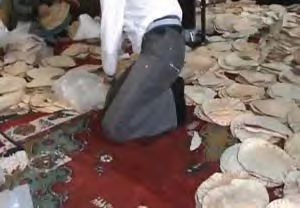
Distributing pita bread in Al-Mayadeen, an outlying city in the Deir ez-Zor Governorate (youtube.com)
The Idlib Governorate
In March 2013 the Al-Nusra Front Department of Relief started providing civil services to the residents of the Idlib Governorate’s outlying areas. The services included repairs of the roads damaged in the battles, carried out by an organization known as the Public Works Brigade. It was also reported that the Al-Nusra Front intended to restore the functioning of public services, including schools, clinics, and shops (Al-Hayat, March 13, 2013).
A Reuters crew visited the city of Salqin, in the northwestern Idlib Governorate. The reporters interviewed Samer Raji, deputy head of the local police. He said that the main rebel groups, with the exception of the Al-Nusra Front, sent officers to staff the local police force. He added, however, that as a last resort, the local police sometimes has to rely on the Al-Nusra Front to enforce the law. “One call from the emir of Jabhat al-Nusra to the commander of a brigade with a wanted man and he’ll show up at court”, Raji added (Reuters, June 20, 2013).
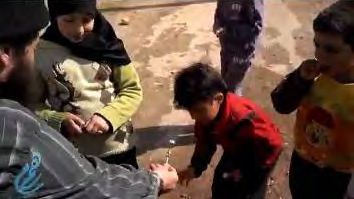
Al-Nusra Front operatives distribute food and candy to children in the Idlib Governorate (YouTube, July 11, 2013)
The Al-Hasakah Governorate
In the Al-Hasakah Governorate, situated in eastern Syria, Al-Nusra Front operatives distribute flour on a daily basis, run bakeries, control the prices of bread, and provide fuel oil (Haqq Islamic News Agency, April 9, 2013).
A reporter for The Guardian who visited the city of Shadadi, eastern Al-Hasakah Governorate, described the Al-Nusra Front’s operations there. According to the report, in northeastern Syria the organization has taken over massive silos of wheat, factories, oil and gas fields, as well as government cars and a large weapons arsenal looted from the Syrian regime.
The Guardian spoke to a local Al-Nusra Front commander, who described the services provided by the organization to the people of Shadadi:
- Food: special Al-Nusra Front teams provide the population with a daily supply of bread baked from 225 sacks of wheat.
- Free electricity and water to the city residents.
- Healthcare services provided from a small clinic in the city.
- Enforcement of Shari’ah-based law and order by newly appointed judges working for the Al-Nusra Front.
The Daraa Governorate
Apparently the Al-Nusra Front still does not operate an ordered, large-scale system of civilian relief as it does in the governorates of northern and eastern Syria. However, there are some initial indications that such activity does take place. According to a report from January 4, 2013, the organization was operating an agricultural association in two regions in the Daraa Governorate and provided it with generators to irrigate about 7,400 acres of farm land (syrialsham.com).
The Al-Suwayda Governorate
The Al-Nusra Front does not have an administrative hold over the Al-Suwayda Governorate, southern Syria, where the Druze are the dominant sect.[39] The organization’s weakness in the area has to do with its ambivalent stance towards the Druze, many of whom have supported the Syrian regime and whose religion is an outgrowth of the Shi’a, a school of thought antagonized by Salafist jihadis. This could be seen in a joint announcement released by the Al-Nusra Front and other Salafistjihadi organizations on December 20, 2012. The announcement called on the people of the Al-Suwayda Governorate, the Druze stronghold in Syria, not to support the Syrian regime “or else [they] will find no rest” (facebook.com).
Managing the oil and gas fields in northern and eastern Syria
In late 2012 and the first half of 2013 most oil and gas fields in eastern and northern Syria (in the governorates of Deir ez-Zor, Al-Raqqa, and Al-Hasakah) were taken over by the rebels. The fields are secured and operated by a coalition of rebels, particularly prominent among which is the Al-Nusra Front. It cooperates with local Sunni tribes that find themselves increasingly pushed out by radical Islamic elements.[40] A top Al-Nusra Front operative codenamed Abu al-Baraa, who spoke to The Guardian by phone, summarized the situation as follows: “Now, we can say that most of the oil wells are in the hands of the rebels, only a single oil facility in Al- Hasakah is still under the control of [Kurdish fighters]. There are two other oil wells close to the Iraqi borders in the desert. The Iraqi army have surrounded them with tanks but we do not know what they are doing with them” (The Guardian, May 19, 2013).
According to reports in the Arab and Western media, the Al-Nusra Front and its allies have reached tacit agreements with the Syrian regime on securing the oil fields and selling oil to Syria and other countries. Under the arrangements, the rebels make sure that oil keeps flowing to the western part of the country in exchange for monthly payments transferred to the Al-Nusra Front. “The Syrian regime itself is paying more than 150m Syrian lire [£1.4m] monthly to Jabhat al-Nusra [Al-Nusra Front] to guarantee oil is kept pumping through two major oil pipelines in Banias and Latakia. Middlemen trusted by both sides are to facilitate the deal and transfer money to the organization,” Abu Saif, an operative for Ahrar al-Sham, told The Guardian (The Guardian, May 19, 2013).
A reporter for The Guardian visited an oil refinery near the city of Shadadi. He said that the refinery, the Al-Nusra Front’s most important asset, was run by a young commander (who had been a law student before the uprising began) named “the emir of gas” by the organization. According to the commander, when the rebels captured the refinery it was run by a joint committee. But then the “emir” decided to remove the rest of the partners for “petty theft” (he argued that the Free Syrian Army had no funding and stole whatever they could get) (The Guardian, July 10, 2013).
In addition, the Al-Nusra Front and its allies independently export various fuel products to many regions in northern Syria and Turkey. According to a Reuters report from May 10, 2013, thousands of barrels of crude oil are smuggled to Turkey daily by small tankers using farm roads. The rebels operate local primitive refineries that cause severe air pollution, using them to produce kerosene, diesel, and cooking oil. The oil trade has spawned a growing demand for oil tankers, as a single shipment could earn a profit of up to £6,000 ($10,000). In addition, Al-Nusra Front operatives sell other products that fall into their hands, including wheat, archeological relics, factory equipment, oil drilling machines, cars, and more (The Guardian citing Ahrar al-Sham operative Abu Saif, May 19, 2013).
The large sums of money made by the Al-Nusra Front from the oil (and other) resources in areas it controls are used by the organization to gain the residents’ support. “It doesn’t take a rocket scientist. You bring in flour, you repair the bakeries, so there are big smiles in the local community. It’s an incredible marketing machine”, a former Syrian oil executive told The Guardian (The Guardian, May 19, 2013; see also The Economist, May 18, 2013). In addition, the Al-Nusra Front uses its profits to buy weapons and pay its operatives (Reuters, May 10, 2013).
[*] Read the other sections here:
![]()
Notes:
[36] One such arrangement, achieved in the city of Aleppo between regime forces and rebel militias, allowed food trucks to enter the rebel-encircled city. The first shipment arrived in the city via the Damascus-Aleppo road after it was opened by the rebels. It was reported at the time that more shipments were on their way (As-Safir, Damas Post, July 15, 2013). On its part, the Syrian regime blamed the “gunmen” from Aleppo, including operatives belonging to the Islamic State in Iraq and Greater Syria, of preventing the transport of food to the city’s western part (Al-Watan, July 15, 2013).
[37] It is also called the Committee of Relief (Lajnat al-Ighatha).
[38] July 2013 saw a rift between the Al-Nusra Front and its allies on one hand and the Kurdish minority in northern and eastern Syria on the other. The clashes that broke out between the two sides were fuelled, among other things, by competition for control over the oil fields in Al-Ramilan, eastern Syria (As-Safir, July 30, 2013).
[39] Syria is home to some 500,000 – 700,000 Druze, most of whom live in the Al-Suwayda Governorate (from a review of Syria’s ethnic groups, Al-Sharq al-Awsat, August 14, 2013).
[40] See Reuters article from April 21, 2013 on violent clashes between the Al-Nusra Front and tribes in the Deir ez-Zor region for control over the oil wells. Thirty-seven people were killed in the clashes.



 RSS
RSS

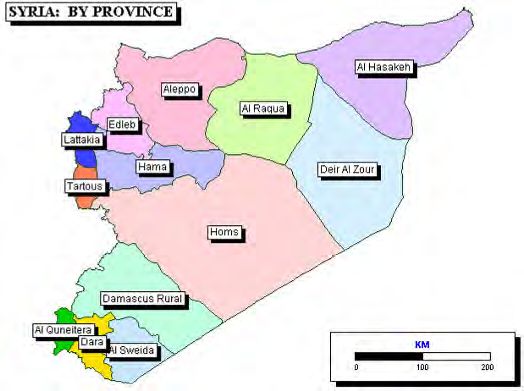


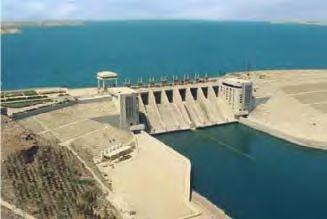
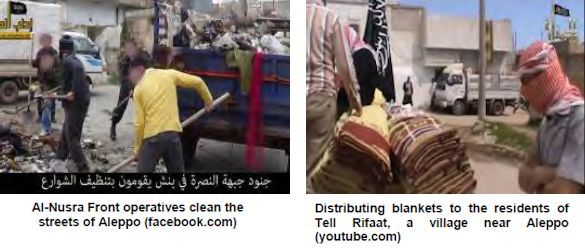

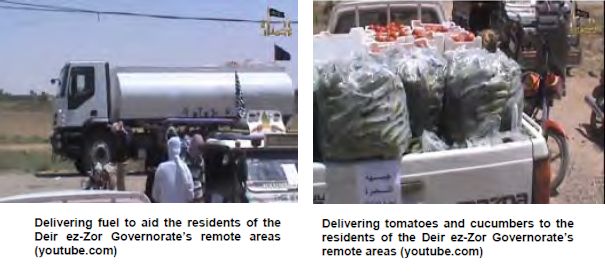
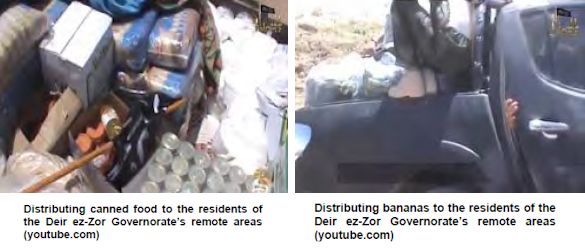
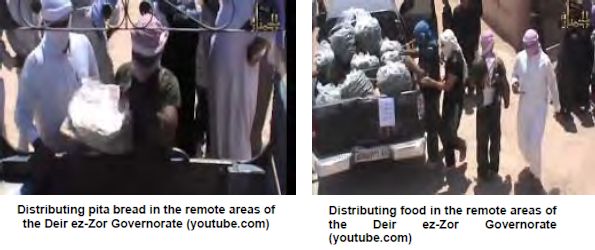

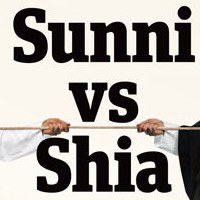
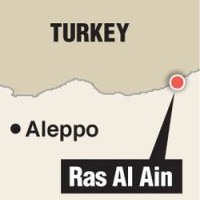
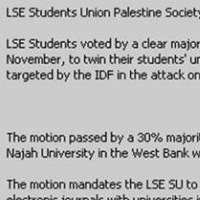
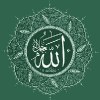
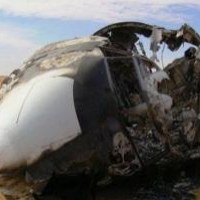




Latest Comments
... [Trackback] [...] Read More: crethiplethi.com/contact-form/trackback/ [...]...
Hello Mike, Thank you for your positive feedback to the article. I felt there wasn’t too much critical analysis of ...
Thanks for this considered and well constructed article. A follow up article on the manner in which the editorial contro...
THE CLUELESSNESS OF CLAIMING THAT OBAMA'S MIDDLE EAST POLICIES WERE A FAILURE CANNOT BE FURTHER FROM THE TRUTH, WHAT THE...
As long as Obama is the president of the usa do not trust the us government......